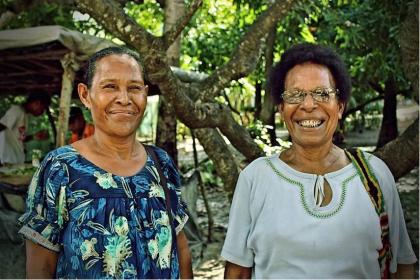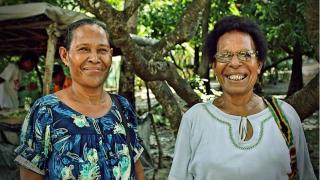Women and gender-diverse people are leading climate solutions worldwide. Unfortunately, less than 0.1 percent of institutional philanthropy is directed to them. This is a missed opportunity for grantmakers committed to ensuring a healthy environment and an equitable world. It can be challenging as a grantmaker to understand precisely how to bridge this funding gap in a meaningful way that is both impactful and locally driven. At a time when environmental protections are being rolled back globally and the philanthropic landscape is facing greater uncertainty, funding grassroots movements at the intersection of gender and the environment may face increased challenges, but it’s more essential than ever. Collectively, we’re at a pivotal moment that requires thoughtful action and different types of collaboration.
Investing in Gender-Just Climate Action
Global Greengrants Fund has been making grants at the intersection of gender and the environment for over ten years. Since 2015, we have made more than $25 million in grants to grassroots groups working on gender-just climate action.
These include groups such as the STEMinist Foundation, led by young feminist climate activists in Ghana working with the government to develop a National Climate Plan. The plan is not just about mitigation and adaptation, but also ensures a just transition to equitable systems and policies that care for both people and the planet.
Another partner, the Pari Women’s Development Association in Papua New Guinea, is replanting mangroves that act as coastal barriers to storm surges caused by climate-induced weather events. Mangroves sequester ten times the amount of carbon as tropical forests, and their ecosystems provide food, livelihoods, and protection from dangerous storm surges.

Members of the Pari Women’s Development Association.
Photo by Nick, Turner/UNDP (PNG)

Mangrove and reef rehabilitation in Pari village. Photo by Nick, Turner/UNDP (PNG)
The iTaukei Women in Conservation (iTWC), in Fiji, trains Indigenous Antioki women and youth to build community-led greenhouses that diversify plantings disrupted by sea level rise and coastal erosion due to climate change. They prioritize growing fruit trees from resilient, Indigenous seeds–providing greater long-term food security.
Philanthropic Collaboratives: Partnering to Increase Funding at the Intersection of Gender and the Environment
Global Greengrants Fund is committed to closing the gender and climate justice funding gap. One way we have advanced our commitments is by creating the Funder Learning Community for Women and the Environment (FLC). Co-hosted by the Ford and MacArthur Foundations, and co-created with Prospera, the FLC was the only coordinated space for different types of philanthropy (environmental, human rights, feminist) to engage in both peer-to-peer learning and funder-to community-learning, and align on practical grantmaking strategies to support gender and environmental justice. The FLC collectively mobilized approximately $2M from funder members who were previously not funding at the intersection of gender and the environment.
We have developed another type of collaboration through Roots Rising, a new collective-led campaign by Global Greengrants Fund, Global Alliance of Green and Gender Action (GAGGA), Women’s Environment & Development Organization (WEDO), Alimentacion red de feministas, Menafem movement, Pesticide Action Network Asia Pacific (PAN), and feminist civil society organizations. The campaign was created to support government and philanthropic actors in mobilizing resources for transformative, gender-inclusive climate action. Roots Rising bridges the gap between philanthropy and bilateral donor governments by collectively moving to transform the way we fund grassroots climate solutions. Roots Rising is a unique collaboration of private foundations, public funders, governments, and grassroots organizations all working together to respond to the urgency of climate change through multi-sectoral partnerships to address intersecting crises.
Roots Rising goes beyond mere numbers; it nurtures trust, collaboration, and transformation. The global partners form an archipelago-like structure to promote gender-just climate action at local, national, and international levels within an interconnected and decentralized structure. They provide resources and support to grassroots collectives, movements, organizations, and networks designing, leading, and implementing gender-just climate action.
Roots Rising provides a first-of-its-kind participatory platform to attract and absorb higher quantities of funding from governments and philanthropy that otherwise do not reach the grassroots. By leveraging existing and established entities, the campaign will ensure that funding flows directly to feminist grassroots movements, eliminating unnecessary hurdles and guaranteeing alignment with gender-just principles. Importantly, Roots Rising isn’t reinventing the wheel; it bridges the gap between existing climate finance and women’s rights funding streams, strategically channeling resources towards the communities that need them most and who hold the most transformative potential for leading us towards a healthier people and planet.
Cross-thematic, cross-movement collaboration is essential to ensure that grantmakers are meeting the most pressing needs of communities around the world. Funding beyond siloes requires building relationships, networks, and honing capacities to constructively challenge ourselves as individuals, institutions, and communities of practice.
Global Greengrants is proud of the role we play in innovating gender-just climate solutions and collaborative funding. And, we call on those in the environmental and climate philanthropy community to join us!
Recommendations for Growing Grassroots Gender-Just Climate Action include:
- Collaborate with partners who have contextual knowledge and local lived experience. Building resilient ecosystems requires localized decision-making power.
- Challenge historic power dynamics and invest time with grantee partners to cultivate trust, open communication, mutual interest, and knowledge exchange.
- Provide flexible timelines, adapt metrics that recognize different ways systemic change happens, and invest in participatory evaluation practices.
- Identify root causes of inequitable structures and systems: land access and control, economic resources, economic empowerment, and knowledge exchange; then support long and mid-term strategies for transformative change.
Incorporate approaches to end violence against women in gender and environmental justice funding, including allocating resources for self and collective care (mental, physical, and childcare), and the well-being of frontline activists, especially women environmental defenders.
Learn more:
Seeds for Harvest: Funding for gender, climate, and environmental justice

Ursula Miniszewski is an internationally recognized expert in gender equity and environmental philanthropy, with more than 15 years of experience working at the intersection of community development, climate activism, and human rights.
As the Director of Gender and Environment at Global Greengrants Fund, she launched the Gender and Environment program and has helped direct more than $25 million in small grants to grassroots, gender-just climate action throughout the Global South. She is also a co-founder of the Funder Learning and Action Co-laboratory for Gender, Environmental, and Climate Justice. A contributing author of the groundbreaking report "Climate Justice and Women's Rights," and a frequent speaker at international conferences, Ursula works closely with the Global Alliance for Green and Gender Action on campaigns to integrate gender justice into government climate finance flows.
She is on the Advisory Board for the Resilience Fund for Women in Global Value Chains, has served on the Environmental Grantmakers’ Association program committee, has taught as an adjunct professor of gender and intersectionality, and was on the Community Council for the Creative Ideas Fund, promoting disability rights in Colorado.
